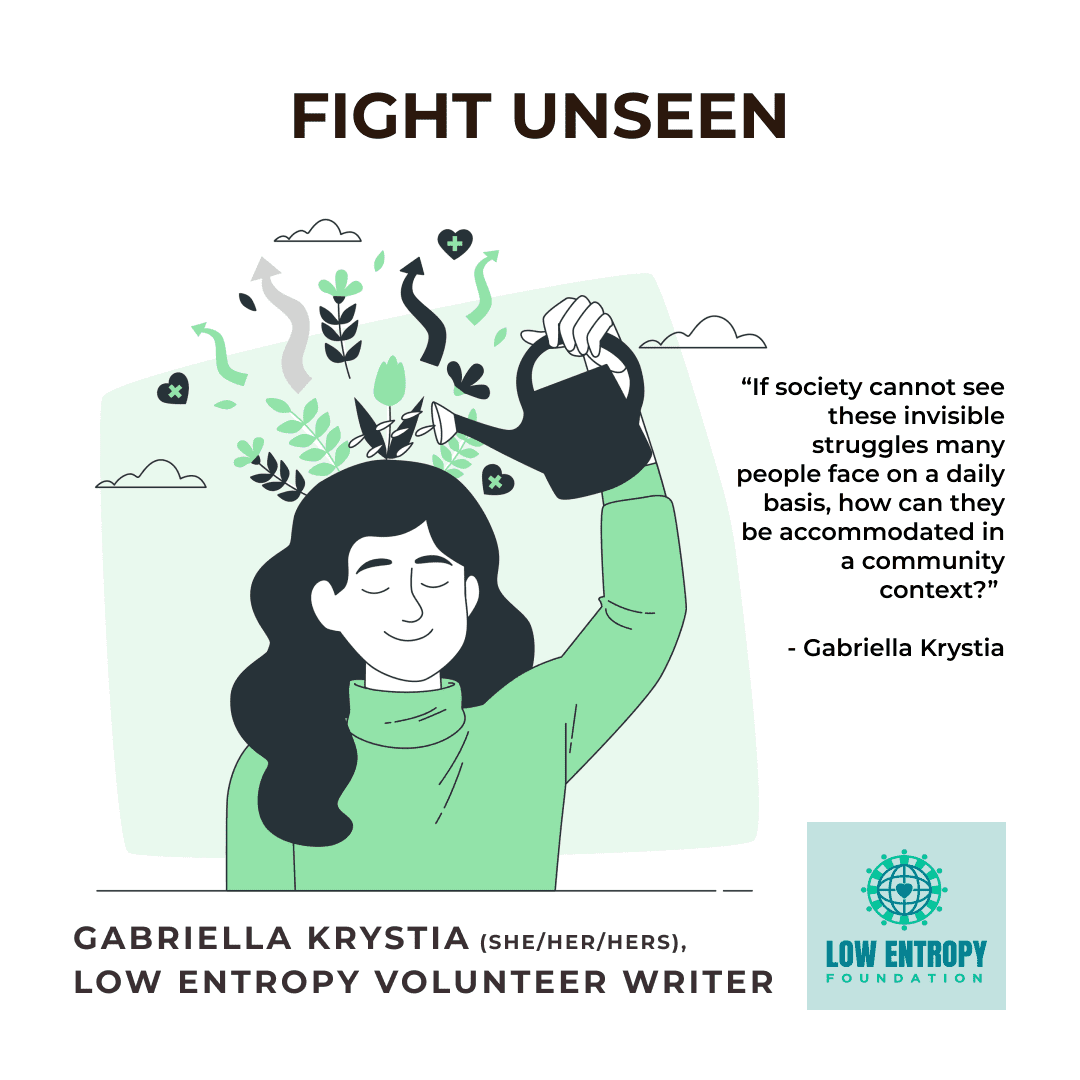Gabriella Krystia (she/her/hers), Low Entropy Volunteer Writer
Mental health is often labelled as invisible, and rightfully so, because society cannot see it. Society is able to see a broken arm or other physical condition, as well as the difficulties and struggles that come with them (temporary or permanent). For the most part, society cannot see the struggles people face, the pain people are feeling or the debilitating symptoms that come with mental health. If society cannot see these invisible struggles many people face on a daily basis, how can they be accommodated in a community context? The benefits of community, which we should all be entitled to, include a sense of belonging, building relationships, and both intellectual and personal development. I propose that education and the removal of stigma would play a significant role in accommodating mental health as a means to keep everyone in our community thriving.
Connecting to community is valuable for everyone. For those who are struggling with their mental health, community is even more important. The connections built with others and sense of belonging are invaluable to those with mental health issues. Personal development allows people to seek supports and services, which benefits their mental health.
Education is one of the most valuable and influential tools we have to create changes within our society. A basic, yet fundamental level of education that focuses on common mental health conditions, commonly seen symptoms and indicators of good mental health could go a long way for our communities, highlighting the fact that all people have mental health, but it looks different for everyone. Providing a basic mental health education to all people would allow society to be more aware and have a stronger understanding of how to support those who are struggling, and would encourage those struggling to seek supports. Education would also play an important role in removing the stigma surrounding mental health.
For most of my life I have been scared of getting ill, likely stemming from past traumas surrounding illness. I was so focused on thinking it was anxiety that I did not look into any other possibilities, but when I was officially diagnosed with OCD my entire perception shifted. Had I been more educated on mental health, I would have known it was acceptable to seek support sooner and investigate the forms of therapy that would have been most beneficial. Through education I have also been able to learn how to support peers, coworkers and family members through their struggles with mental health in a safe and supportive environment, free from both judgment and stigma.
Reducing or removing stigma is the second and possibly the most important thing communities can do to help accommodate people who have mental health conditions or struggle with their mental health in general. Mental health has been considered something “taboo” for far too long. Although I will agree we have come a long way from where we once were, there is still lots of stigma associated with mental health. I recognize removing stigma completely may not be an option, but reducing stigma is definitely possible. This goes hand-in-hand in hand with education. As society becomes more knowledgeable about mental health, we should begin to see less discrimination and improvement in how individuals are treated. We will begin to recognize the strength that people with mental health can hold, and they will not be treated poorly or viewed through a negative lens.
Another personal anecdote I wish to leave you with is also from my OCD diagnosis. In my work community, full of people who recognize and understand mental health, I have never felt less than or felt like I was treated differently due to my mental health issues. By building communities that are educated on mental health and stigma-free, I hope we can all feel the sense of relief you get when your community can accommodate your invisible struggle, allowing you to have a sense of belonging, build meaningful relationships, and grow, both intellectually and personally.
—
Leave your thoughts for Gabriella in the comments below. You can also follow us on Facebook, Instagram, TikTok, Twitter and YouTube to stay up-to-date with Low Entropy news!


Gabriella, thank you for your article! As an educator it is so important for me to get this exact perspective on mental health across to my students! I teach elementary students, and in the last year have added the teacher-librarian role to my daily work. This allows me to connect with many classes and focus on mental health during the year. I am encouraged with resources that have come out in recent years but we need more for students right from am early age. Keep up the great work, and keep reaching to get this message out!
So eloquently put! You couldn’t be more right. Communities can heal and break stigma with awareness of education.